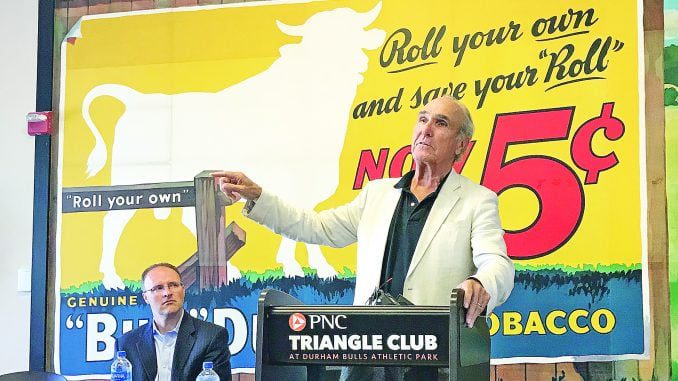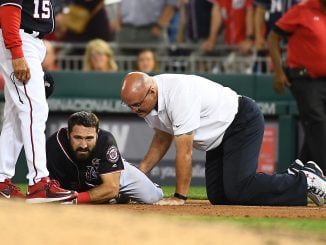
DURHAM — Ron Shelton didn’t set his goals high the first time he came to Durham.
“I just came down here trying to stay on schedule and not get fired,” he said. “It worked out pretty well.”
The former minor league infielder was embarking on his second career, 30 years ago, as he made his directorial debut with a movie that filmed in the Triangle — “Bull Durham.”
Three decades later, Shelton returned to the area to celebrate the anniversary of the movie’s release.
“I don’t watch the movie very much anymore,” Shelton said. “Turner Classic Movies has a big three-day film festival every year in Los Angeles, and they designate movies as classics. Mel Brooks was there to present ‘The Producers’ to open the series. Then the next day, we watched ‘Bull Durham.’ Knowing I was going to come here (to Durham), what I saw this time was all the very specific memories of Durham — where we were, the fact that I couldn’t get a place to eat at night, because the whole town didn’t exist yet.”
Indeed, the only thing that has held up better than the movie, and Shelton’s film career, over the last 30 years is the city where it all started.
“I remember choosing Durham for a number of reasons,” he said. “Number one was that it was so run down. I loved the DAP (Durham Athletic Park, the home of the Bulls at the time) so much, because it was in neighborhoods, and people would walk to the games. I loved all the abandoned tobacco warehouses that kind of said this town has seen better days — also, I was able to build some sets in those abandoned warehouses. When I came back 10 years ago, I didn’t recognize the area. If this movie had the tiniest bit to do with the resurgence of minor league baseball, which helped a little bit with the resurgence of this area, then I’m delighted.”
Just getting to Durham was a tough road for Shelton and his team.

“We went crazy to make it,” he said. “It was a script that nobody wanted to make. It was turned down by every studio, twice. Kevin Costner, who was an emerging star but not yet quite a star, stayed there. He never quit showing up to meetings until the late, great Orion Pictures Studios finally said, ‘Let’s take a chance.’ … I didn’t know when we made this movie 30 years ago that I’d be here, with people still talking about it.”
Part of the reason that it’s gone down in history as one of the best sports movies ever is that it’s about something much bigger than sports.
“It’s a baseball move, and no, it’s not a baseball movie at all,” he said. “There isn’t that much baseball in it. It’s about people and human behavior. What it really is about is two people who have come to that place in their life where they have to make a change, because what they’ve been doing maybe isn’t working anymore. To make the change takes a kind of risk that they haven’t taken for a long time. Crash (Davis, Costner’s character) is a guy who loves something more than it loves him back: Baseball. I think that’s universal. Annie (Susan Sarandon’s character) has invented a version of herself that she knows can’t sustain any longer, and one of these days, she’s going to have to take a chance on a real relationship. The idea that these people cross paths with each other, and it triggers something about the place in their lives they haven’t wanted to face, I think that maybe is the universal in it. Plus, the fact that it’s funny and sexy and irreverent along the way.”
The fact that it’s unlike other sports movies was intentional, and a tribute to Shelton’s playing career.
“I wanted to make a sports movie that I liked that wasn’t about a home run in the bottom of the ninth, because they almost never happen,” he said. “I hate movies and writing about baseball that are so lyrical and poetic. They aren’t really what it’s like to play. What it’s like to play is you’re trying to get a hit. You’re trying to make the play. You don’t want to make any errors. You want to get two hits if you’ve got one. You don’t want to go 0-for-5.
“You’re in Double-A. There’s a guy in A-ball hitting .350, and you’re hitting .250. You’ve got to figure out how he doesn’t take your job. There’s a guy in Triple-A that might get traded and open up a spot for you. That’s what life as a ballplayer is like,” he continued. “I can guarantee you everybody on these teams playing tonight— if a guy is 1-for-6 in the series and he gets a line drive into the gap in left, by the time he pulls into second base, he knows that he’s now 2-for-7, which is .286, and he’s gone from having a bad series to having a good one. I guarantee you he knows that. Most movies are from a fan’s point of view. I try to make sports movies from a player’s point-of-view.”
While it’s a different perspective on the sport than the people who wax poetic about the sport, Shelton’s love for baseball is just as real — and large — as the authors of the odes to the game that he hates so much.
“My love of the game comes through in the irreverence,” he said. “Poor Nuke (Timothy Robbins’ character) is introduced with his pants around of his ankles, and, at the end of the movie, he has a kind of dignity as he goes off to the big club. He’s learned. He’s growing. He’s being educated by Crash and Annie, and he’s learning. Meanwhile, Crash is in a reckoning of his life: I can’t do this forever. Even though he’s really good at it.”
It all added up to a classic, one that Shelton returned to a transformed Durham to celebrate. And yet, memories of 30 years ago kept cropping up.
“We had a screening at the Carolina Theater,” he recalled. “That brought back a memory from 30 years ago. There’s about 500 reviews you get, nationally — local papers, TV stations, major magazines. The only bad review the movie got was from the Durham paper.”
He grinned and added, “You never forget a bad review.”



